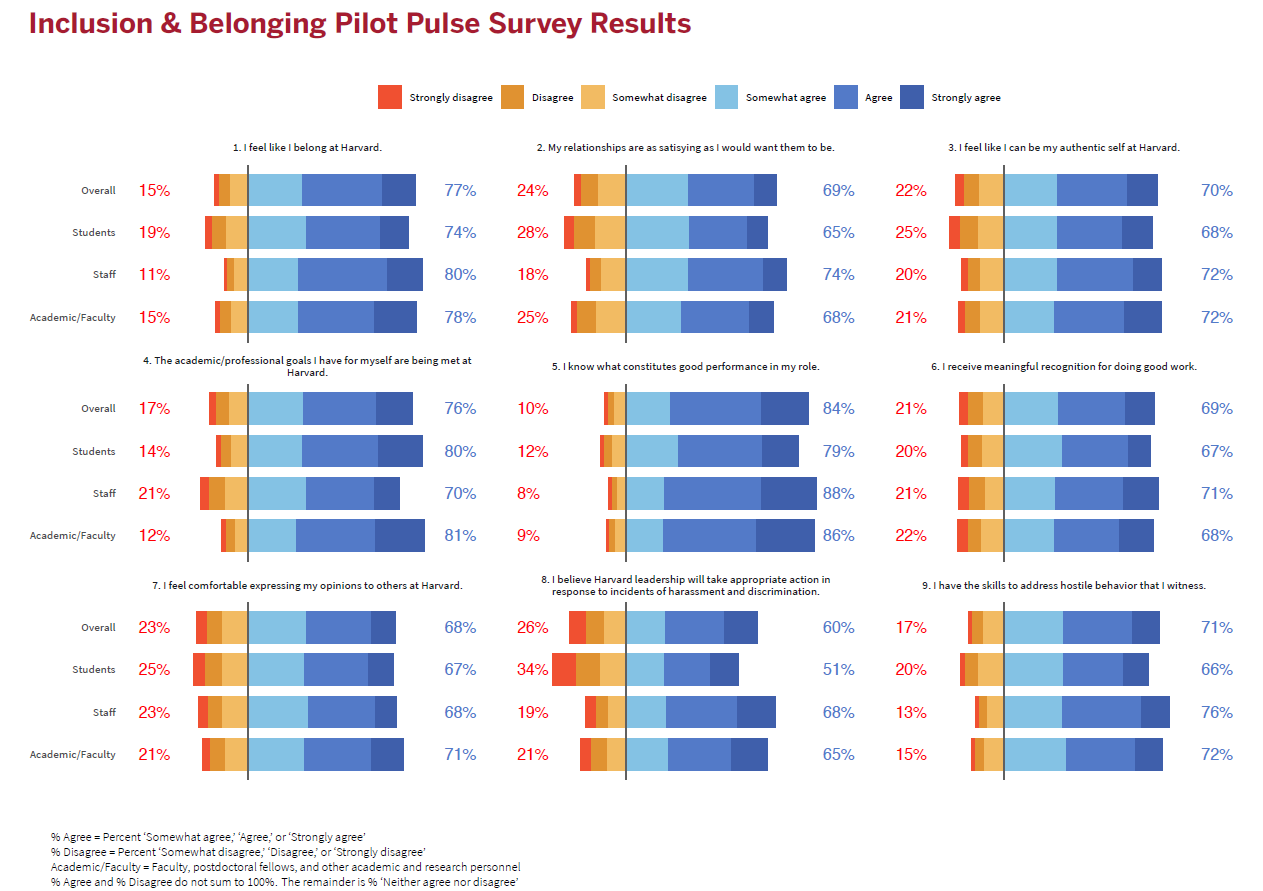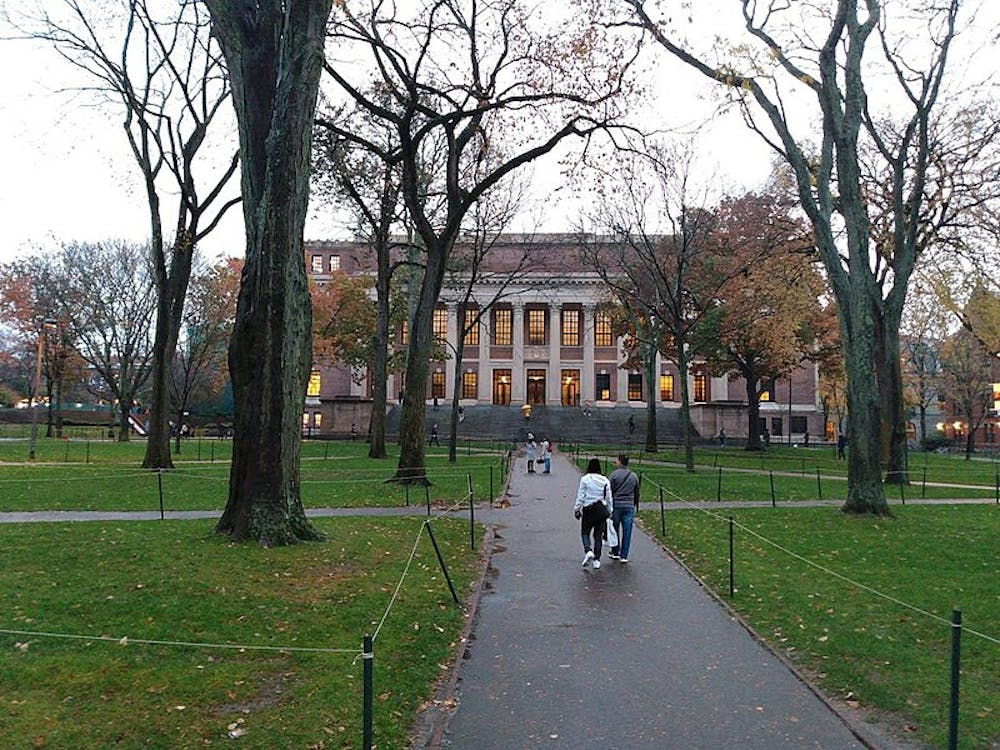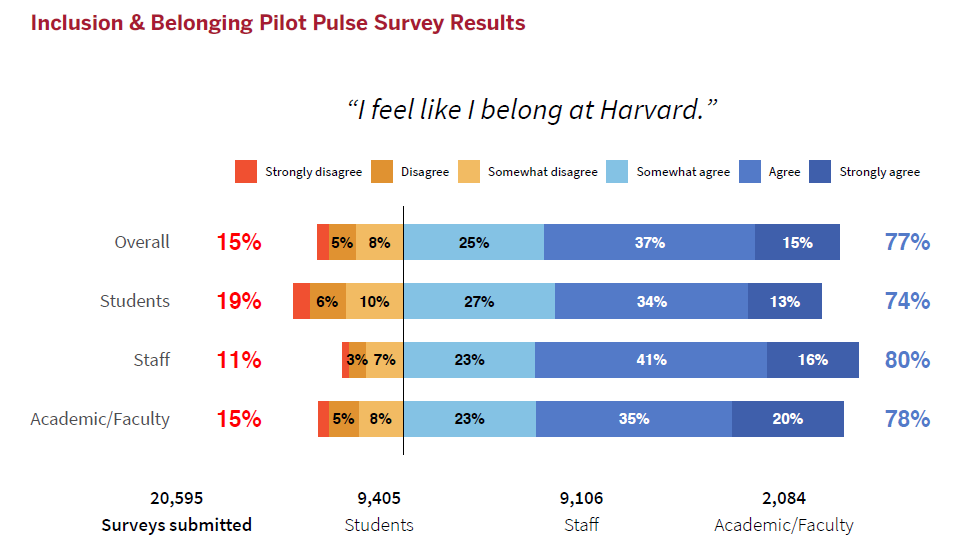The **Harvard Pulse Survey** plays a crucial role in understanding the current landscape of inclusion and belonging within the Harvard community. Launched in 2019, this survey actively engages students, faculty, and staff, gathering essential information on how individuals perceive their place and interactions within the university. Recently administered in September 2024, the results reveal a strong sense of community belonging, particularly within spaces like the Harvard Library, yet highlight gaps in comfort around sharing diverse opinions. As Harvard strives to implement culture improvements, the insights gathered from this community survey are invaluable in fostering an environment where every member feels respected and valued. Ultimately, the Harvard Pulse Survey serves not just as a assessment tool, but as a catalyst for enhancing campus culture through targeted initiatives that promote inclusion and belonging.
The recent community survey at Harvard, known as the Campus & Community Pulse Survey, provides critical insights into the experiences of its members regarding belonging and inclusivity. This ongoing assessment tool allows the university to monitor the climate surrounding community connections and respect among varied perspectives. With thousands of responses gathered, the survey paints a portrait of the current campus environment, emphasizing both the strengths and areas needing attention. By focusing on how individuals relate to one another and the institution, this initiative propels Harvard’s mission of fostering an inclusive campus culture. Such efforts, including targeted programs and trust-building opportunities, aim to cultivate a deeper sense of belonging within the Harvard community.
Understanding the Importance of the Harvard Pulse Survey
The Harvard Pulse Survey serves as a critical instrument for assessing the state of inclusion and belonging within the Harvard community. After its initiation in 2019, this survey was designed to measure how well community members feel connected and valued within the campus environment. In its recent iteration, the data collected indicated a strong sense of belonging among respondents, with 78% of students expressing that they feel a part of the Harvard community. This highlights a significant achievement in fostering a culture where individuals are encouraged to express their voices. However, the survey also revealed a crucial area for improvement: many respondents reported discomfort in sharing their opinions and forming relationships across different perspectives. This insight is vital for guiding future initiatives aimed at enhancing the overall campus culture and ensuring that every voice is heard and valued, furthering the commitment to inclusion and belonging.
Analyzing the survey’s findings provides a roadmap for potential improvements and interventions at Harvard. By understanding the nuances of community belonging and the challenges faced by individuals when expressing their viewpoints, administrators and faculty can work collectively to create environments that foster open dialogue. Additionally, the feedback on comfort levels in sharing different opinions is a call to action for enhancing programs designed to bridge gaps among community members, particularly regarding diverse perspectives. As President Alan M. Garber noted, leveraging the insights from the Pulse Survey can guide the university in creating a culture that not only respects diverse opinions but actively promotes a sense of kinship among the entire campus population.
Key Findings from the Harvard Pulse Survey on Inclusion and Belonging
The latest Pulse Survey results reveal encouraging statistics about the Harvard community’s feelings of inclusion and belonging. For example, 81% of faculty and staff reported feeling respected within their roles, a promising indicator that the university is making strides toward cultivating a respectful environment. However, the survey also uncovered that a significant portion of the community still feels disconnected from their peers, leading to a crucial need for addressing these gaps. This duality of results illustrates the complexity of achieving a fully inclusive campus culture, where all individuals feel both respected and connected. Stakeholders must take this data seriously to mobilize efforts toward enhancing community ties across diverse student and staff populations.
Further examination of the data indicates that while many feel valued at Harvard, there is still room for growth in areas related to comfort in sharing divergent opinions. For instance, the Pulse Survey’s results highlighted that only 60% of individuals were comfortable engaging in discussions with those who hold opposing views. This response underscores a critical challenge for the institution going forward: fostering environments that encourage constructive dialogue and understanding among differing perspectives. Engaging in community-building initiatives that focus on these aspects is essential for leveraging the full potential of the diverse views present in the Harvard community, reinforcing the principle that every perspective enriches the campus experience.
Enhancing Campus Culture through Insights from the Harvard Community Survey
Insights drawn from the Harvard Pulse Survey will be paramount in driving culture improvements across the campus. The survey’s findings serve as both a reflection of current sentiment and a guide for future endeavors aimed at strengthening community ties. Programs like the Harvard Culture Lab Innovation Fund (HCLIF) reflect the university’s commitment to fostering an innovative culture of belonging, wherein projects designed to enhance community involvement are actively supported. This proactive approach to utilizing survey data is crucial for sustaining a dynamic campus environment where community members feel empowered to contribute positively to the culture at large.
Additionally, initiatives stemming from the survey results must remain aligned with the university’s overarching goals of inclusion. By examining the areas identified for improvement, administrators can allocate resources strategically to develop programs and services that resonate with the community’s needs. For example, strengthening networks for sharing ideas and experiences among students and faculty will cultivate an atmosphere of acceptance and mutual respect, crucial components of a resilient academic community. Overall, leveraging survey insights to inform strategic actions will enhance Harvard’s mission to create an inclusive environment that celebrates diversity and promotes a genuine sense of belonging.
The Role of Community and Belonging in Academic Success
Community and belonging are integral components of academic success, especially within a prestigious institution like Harvard. Strong social networks foster a supportive environment, encouraging students and faculty alike to thrive academically and personally. The Pulse Survey identified a disparity between those who feel a strong connection to the Harvard community and those who do not, emphasizing the necessity of bridging these gaps to enhance educational outcomes. Understanding that a sense of belonging contributes significantly to student engagement and retention, the university must prioritize building these essential relationships among its members.
Incorporating initiatives that focus on community enhancement can lead to higher retention rates and overall student satisfaction. Programs that promote interaction among students of diverse backgrounds and viewpoints can increase feelings of acceptance and integration within the broader campus culture. As Harvard continually seeks to uphold its reputation as a leader in education, recognizing and developing community programs that cater to diverse populations will ensure that all members feel seen, heard, and valued.
Next Steps for the Harvard Community Post-Survey Analysis
Following the release of the Harvard Pulse Survey data, the next steps for the university involve concrete actions aimed at improving inclusion and belonging within the community. Engaging with stakeholders, including students, faculty, and staff, to discuss survey findings is essential for rallying support and collaboratively developing action plans. These discussions will help identify specific initiatives that can be implemented to address the gaps highlighted in the survey, ensuring that the voices of all community members are integrated into the decision-making processes.
Moreover, the university’s commitment to tracking progress and conducting future surveys will ensure that improvements are sustained and informed by the community’s evolving needs. By establishing ongoing dialogues focused on community belonging, Harvard can consistently adapt its strategies and reinforce a culture of inclusivity. This proactive stance will be crucial in creating a dynamic environment where all individuals are prioritized, fostering an academic culture that celebrates diversity and personal connections.
Community Programs Facilitating Inclusion at Harvard
Harvard’s focus on creating and enhancing community programs is pivotal in promoting a sense of belonging among its members. Initiatives such as the President’s Building Bridges Fund highlight the university’s commitment to funding student-driven projects that encourage connections across diverse views. These programs not only provide valuable resources but also empower students to take an active role in fostering inclusivity on campus. Through these efforts, Harvard champions an academic culture where differences are acknowledged and celebrated, creating a richer educational experience for everyone.
Additionally, partnerships among various departments and student organizations play a crucial role in enhancing the impact of community programs. By collaborating on events and workshops that emphasize inclusion and belonging, Harvard can leverage the diverse talents and insights from its members to craft engaging and meaningful experiences. These collaborative efforts are essential in cultivating an atmosphere of support and understanding, thereby reinforcing Harvard’s mission to build a cohesive and inclusive campus community.
The Impact of Digital Communities on Campus Culture
In an increasingly digital world, online platforms have become essential in fostering community and belonging among university members. Harvard has actively embraced these digital spaces to complement its in-person initiatives, ensuring that all students and faculty have multiple avenues to connect and share their experiences. The university’s newsletter, which boasts 16,000 subscribers, serves as a key communication tool to disseminate information and promote engagement across various campus communities. Such digital outreach allows individuals to feel connected even when they cannot participate in-person, breaking down barriers and enhancing social ties.
Moreover, leveraging technology to create virtual communities provides an additional layer of support for individuals who may feel isolated. Online forums and social media groups can facilitate conversations about shared experiences and differences, encouraging a sense of belonging that transcends physical limitations. By integrating both physical and digital communities, Harvard is well-positioned to create a holistic campus culture that addresses the needs of its diverse population, ensuring every member feels a part of the Harvard experience.
Integrating Feedback Mechanisms for Continuous Improvement
One of the key takeaways from the Harvard Pulse Survey is the need for effective feedback mechanisms to ensure the continuous improvement of campus culture. To truly understand and respond to community needs, Harvard must establish channels that allow for ongoing dialogue among students, faculty, and staff. These mechanisms can range from regular check-ins and town hall meetings to more structured feedback tools, which can help gauge progress on inclusion and belonging initiatives. Such engagements reinforce the notion that every voice plays a crucial role in shaping the university’s direction.
Additionally, integrating feedback from the community will enable Harvard to remain responsive to shifting dynamics on campus. This adaptability is vital for implementing successful programs while addressing emerging challenges. By prioritizing active listening and engagement, Harvard can strengthen its commitments to inclusion and belonging, creating an academic environment that evolves alongside its members and nurtures a culture of respect and understanding.
Future Considerations for Harvard’s Inclusion Initiatives
As Harvard reflects on the findings from the Pulse Survey, it is essential to consider future strategies that will further enhance campus culture. The insights gathered indicate both strengths and areas needing attention regarding community belonging and inclusion. Moving forward, the university must remain intentional in developing robust initiatives that address these gaps while building on successful programs. Collaborating with students and faculty to co-create experiences will ensure initiatives remain relevant and impactful, encouraging collective ownership over the community’s growth.
In addition to existing programs, exploring innovative approaches to foster connection among diverse groups is critical for Harvard’s long-term success. Adapting to new challenges, such as those posed by changing demographics or shifts in societal expectations, will require proactive measures that resonate with all community members. By committing to a comprehensive strategy that includes evaluating existing efforts and seeking new opportunities for engagement, Harvard can truly embody its principles of inclusion and belonging, securing a strong and vibrant campus culture for future generations.
Frequently Asked Questions
What is the Harvard Pulse Survey and its purpose?
The Harvard Pulse Survey is a community survey aimed at assessing the climate of inclusion and belonging within the Harvard community. First piloted in 2019, the survey gathers feedback from students, faculty, researchers, and staff to gauge their experiences and feelings of value, connection, and respect, ultimately guiding initiatives to enhance campus culture.
How often is the Harvard Pulse Survey conducted?
The Harvard Pulse Survey is conducted periodically, with the most recent survey administered in September 2024. This follows the initial survey in 2019, allowing Harvard to track progress on inclusion and belonging goals within the campus community.
What were the key findings from the latest Harvard Pulse Survey?
The 2024 Harvard Pulse Survey revealed that a significant majority of respondents feel a strong sense of belonging and respect within the Harvard community. However, it also highlighted areas for improvement, particularly in forming relationships across differing opinions and effectively sharing personal views.
How does the Harvard Pulse Survey influence campus culture and improvements?
The results from the Harvard Pulse Survey are used to inform decisions regarding resource allocation and programming aimed at fostering a supportive campus culture. The survey data helps identify areas for enhancement in inclusion and belonging among community members.
Who participates in the Harvard Pulse Survey?
The Harvard Pulse Survey is designed for all members of the Harvard community, including students, faculty, researchers, and staff. This wide participation ensures a comprehensive understanding of the diverse experiences related to inclusion and belonging at Harvard.
What initiatives have been implemented following the Harvard Pulse Survey findings?
In response to insights gained from the Harvard Pulse Survey, initiatives like the Harvard Culture Lab Innovation Fund (HCLIF) and the President’s Building Bridges Fund have been established. These programs support projects and activities that promote community engagement and foster a culture of belonging across differences.
What is the benefit of conducting the Harvard Pulse Survey for the community?
Conducting the Harvard Pulse Survey provides invaluable insights into the experiences of the Harvard community regarding inclusion and belonging. The information collected serves as a catalyst for developing targeted initiatives that aim to strengthen community ties and improve campus culture.
When can we expect the next Harvard Pulse Survey and what will happen next?
While a specific date for the next Harvard Pulse Survey has not been determined, it will be conducted after adequate time for meaningful progress can be measured. The next steps involve analyzing current data to guide future initiatives that enhance a sense of belonging within the campus community.
| Key Point | Details |
|---|---|
| Overview | The Harvard Pulse Survey shows a strong sense of belonging at Harvard Widener Library, but identifies gaps in opinion sharing. |
| Survey Participants | Over 10,000 members participated, representing about 20% of the Harvard community. |
| Sense of Belonging | 78% of students, 81% of staff, and 75% of faculty feel they belong. |
| Respect Levels | 80% of students, 79% of staff, and 74% of faculty feel respected. |
| Areas Needing Improvement | Lower comfort levels in sharing opinions and forming relationships across differences. |
| Future Actions | Data will guide improvements in campus culture and community initiatives. |
Summary
The Harvard Pulse Survey highlights the importance of inclusion and belonging within the community, showcasing significant positive sentiments among students, faculty, and staff. While the results demonstrate a strong overall sense of belonging, they also reveal critical areas for enhancement, particularly in fostering open communication and bridging divides among individuals with differing opinions. Moving forward, the insights gained from the Harvard Pulse Survey will play a crucial role in shaping initiatives aimed at strengthening community ties and ensuring everyone feels included and valued at Harvard.




